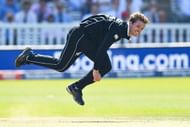
It's hard not to feel for New Zealand after their loss to England in the World Cup final.
They had overcome an average batting performance with a blistering bowling and fielding performance, only to find themselves wondering what could have been had a few things gone their way.
What if Trent Boult had avoided stepping on the boundary when he caught Ben Stokes? What if the ball hadn't deflected off the bat of Stokes and gone towards the boundary for overthrows? What if Mitchell Santner had taken a run off the last ball of New Zealand's innings?
Despite all the setbacks, New Zealand fought and scrapped and attacked relentlessly all the way until the final ball of the Super Over, when their chances of winning the World Cup for the first time were dashed by a throw from deep that caught Martin Guptill short of his crease.
It seemed the cruelest of fates to have come so far, only to fail at the final hurdle. But when the dust settles and New Zealand look back at their campaign, they will find several reasons to be proud of their performances. From their refusal to believe that the game was over until it was over, to hold their nerve better than their opponents in crunch situations, to simply enjoying the game of cricket for the game that it is and being exemplary ambassadors for the sport.
Central to all of this was their captain Kane Williamson. The Player of the Tournament, he led from the front with the batting with 578 runs, including 2 centuries and 2 half-centuries. His runs and assessment of conditions often gave New Zealand a chance at victory in several games, and his management of the excellent bowling attack at his disposal was exceptional during crucial moments.
More impressive was his temperament at crucial moments, especially during the semi-final against India and the final against England, where he refused to let the situation get to him, slowed the game down, and made sure that his team had the best possible chance of winning during crucial moments against India, West Indies, South Africa, and England.
Williamson's excellence with the bat often obscured the frailties of their batting order, specifically their opening batsmen. Martin Guptill, Colin Munro, and Henry Nicholls managed 1 half-century each, with Guptill, in particular, enduring a wretched tournament with only 186 runs. His value to the team, however, was evident in his run-out of MS Dhoni in the semi-final that single-handedly ensured that India had no chance of going to the final, and he was one of the batsmen selected to face the Super Over for his speed in running between the wickets.
Ross Taylor (3 half-centuries), Jimmy Neesham (1 half-century) and Colin de Grandhomme (3 half-centuries) impressed with the bat as well. Tom Latham had one inning of note against England during the group stage but was poor otherwise. His wicket-keeping was excellent throughout.

It was New Zealand's bowling that kept them alive throughout the tournament alongside the runs that Kane scored. Trent Boult (17 wickets) and Matt Henry (14 wickets) swung the ball upfront, often getting early breakthroughs. Reducing India to 5/3 and 24/4 through consistent line, length and swing bowling in the semi-final was one of many highlights of their campaign.
Lockie Ferguson was their leading wicket-taker with 21 wickets, most of them coming during the middle-overs. He was often used as a strike bowler due to his searing pace and short-pitched bowling tactics, with an off-stump yorker against Faf du Plessis etching itself in memory.
Allrounders Jimmy Neesham (15 wickets), Colin de Grandhomme (6 wickets) and Mitchell Santner (6 wickets) also contributed. Notably, Neesham was the only bowler to concede more than 5 runs an over after playing more than one match. Tim Southee played in one match - the group game against England - and took 1 wicket, but was often seen discussing tactics with Kane and coach Gary Stead throughout the tournament, and was an excellent fielding substitute when needed.
In the end, the Black Caps can reflect positively on their performance. They may have not won the final, but they will realize that they were a part of what could possibly have been the greatest ODI match to date. That their defeat came down to a second tiebreaker (in boundary count, which they lost 17-26) after the first tiebreaker (the Super Over) itself ended in a tie was reflective of their fighting spirit.
Identifying a proper opening batsman to accompany Martin Guptill is something that they need going forward, alongside greater consistency from their batsmen.
Also read – World cup winners list
Follow Sportskeeda for all the updates on World Cup schedule, points table, news, World Cup most runs, live scores, most runs, most wickets and fantasy tips.
Looking for fast live cricket scores? Download CricRocket and get fast score updates, top-notch commentary in-depth match stats & much more! 🚀☄️
